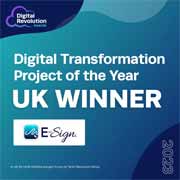The Legality of eSignatures in the United Arab Emirates
Explore the legality of electronic signatures in the United Arab Emirates and the laws and regulations that govern their use.

Trusted By
Are eSignatures Legally Binding in the United Arab Emirates?
Documents that can be signed electronically
The Electronic Transactions Laws impose no specific restrictions on the use of electronic signatures for executing certain types of documents or transactions. However, government ministries may still mandate the use of handwritten signatures for forms or documents submitted to them. Additionally, given some legal uncertainties, it is advisable to exercise caution when relying on electronic signatures for high-value or business-critical agreements.
Electronic signature guidance
Onshore UAE:
The UAE Electronic Transactions Law is governed by its Executive Regulations, both of which are published in Arabic.
ADGM:
The ADGM Electronic Transactions Regulations allow for cross-border recognition of electronic signatures that are created, issued, used, or performed outside of the ADGM or the UAE.
DIFC:
No additional provisions are specified.
Types of e-signature permitted in the UAE
Onshore UAE
The UAE Electronic Transactions Law defines two primary categories of electronic signatures: Reliable Electronic Signatures and Qualified Electronic Signatures (QES).
- Reliable Electronic Signatures must fulfil the following criteria:
- They are uniquely linked to and under the sole control of the signer.
- They enable the identification of the signer.
- They are connected to the associated data in a way that any alterations to the data can be detected.
- They are created using technical and security methods as prescribed by the Executive Regulations.
- They comply with any additional requirements outlined by the Executive Regulations.
- Qualified Electronic Signatures (QES) build upon reliable signatures by requiring the use of specific QES devices and qualified electronic signature authentication certificates. These devices must adhere to the standards outlined in the UAE Electronic Transactions Law, ensuring the confidentiality, authenticity, and security of the electronic signatures they generate.
ADGM
Under the ADGM Electronic Transactions Regulations, an electronic signature is deemed valid if it is both “reliable” and appropriate for the document’s intended purpose, considering all relevant circumstances. This assessment may include any agreements between the parties or evidence demonstrating that the signature fulfils its required functions, either alone or in combination with other proof.
An electronic signature is considered reliable if it meets the following criteria:
- The signature creation data is uniquely linked to the signer and no one else.
- The signer maintained sole control over the signature creation data at the time the signature was made.
- Any alterations to the electronic signature are detectable.
- When the purpose of the legal requirement for a signature is to ensure the integrity of the signed information, any changes to the information post-signing must also be detectable.
Only electronic signatures classified as “valid” under the ADGM regulations carry the same legal authority as handwritten signatures.
DIFC
According to the DIFC Electronic Transactions Law, an electronic signature is considered “valid” if it:
- Identifies the signer.
- Demonstrates the signer’s intent to sign the document.
Additionally, the electronic signature must meet one of the following conditions:
- It is as reliable as appropriate for the purpose for which the document was created, taking into account all relevant circumstances.
- It is proven to have fulfilled the required functions, either independently or in conjunction with supporting evidence.
Notable legality changes since 2020
Significant updates to e-signature laws in the UAE since 2020 include the following:
- Replacement of Federal Law No. 1 (2006):
In 2021, the UAE Electronic Transactions Law replaced Federal Law No. 1 of 2006 on e-transactions and e-commerce, introducing updated regulations governing electronic signatures and transactions. - Introduction of the ADGM Electronic Transactions Regulations:
In February 2021, the ADGM Electronic Transactions Regulations were enacted, specifically addressing the use of electronic signatures within the Abu Dhabi Global Market (ADGM) free zone. - Abrogation of Dubai’s Electronic Signature Law:
The issuance of the UAE Electronic Signatures Law in September 2021 led to the repeal of Dubai’s previous electronic signature law, consolidating regulations under the federal framework.
Publicly Accessible Links to Laws/Regulations Discussed
Disclaimer
The content provided on this website is meant for general informational use only and does not constitute legal advice. Legal regulations on this topic can evolve rapidly, so E-Sign does not ensure that the information presented here is always up-to-date or accurate. If you have particular legal concerns regarding any details on this site, it is recommended that you consult with a licensed attorney in your jurisdiction.
Last Updated 9th October 2024




























